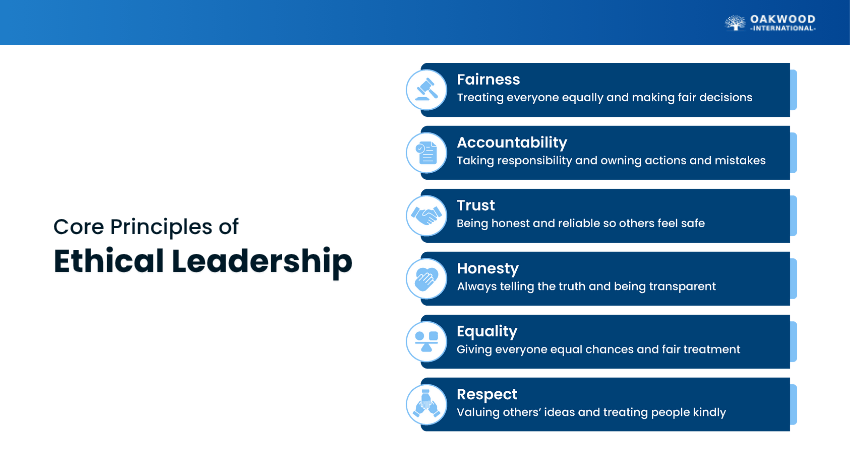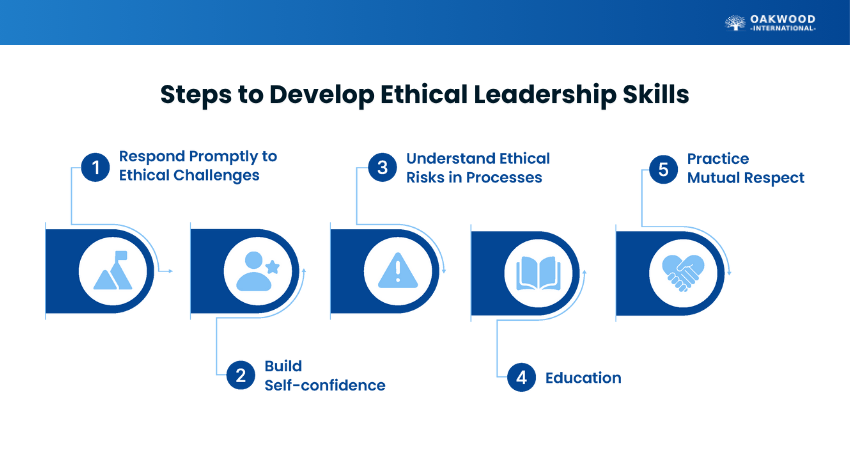Table of Contents


Think about a leader who made you feel heard, supported and respected. They cared about people, stayed honest and did the right thing even when it was hard. Now think of a leader who ignored ideas or treated people unfairly. That difference shows the real power of leading with strong values. In the UK, 40% of employees feel their leaders show strong Ethical Leadership, which makes this skill more important than ever.
In this blog, we will explain Ethical Leadership in simple words. You will learn what it means, why it matters, core principles, and key traits. Also, steps to become an Ethical Leader, ways to build these skills and real examples to understand it better.
What is Ethical Leadership?
Ethical Leadership means leading by doing the right thing and showing good behaviour yourself. It focuses on fairness, honesty, and taking responsibility. Ethical Leaders make choices that are fair and helpful for everyone, not just themselves. They follow good values and encourage others to act with integrity, too.
They remain truthful, accept accountability and choose actions that do not harm others. By leading this way, they build trust, confidence and respect within their teams. Ethical Leadership is not only about following rules; it is about doing the right thing even when no one is watching. This approach creates a safe, supportive and positive working environment where people feel valued and respected.
Why is Ethical Leadership Important?
Ethical Leadership is important because it builds trust, respect and stronger relationships within the workplace. When leaders act with honesty and fairness, employees feel safe, valued and motivated to do their best work. It also reduces conflict, prevents unfair behaviour and creates an environment where people can grow confidently.
It also helps by:
a) Creating a healthy and positive work culture
b) Improving communication and teamwork
c) Encouraging employees to share ideas
d) Reducing stress and workplace issues
e) Building a strong and honest reputation
f) Attracting and keeping talented employees
Core Principles of Ethical Leadership
Ethical Leaders follow strong values that guide their actions and help them stay fair, respectful, and honest. When Ethical Leadership is practised, the workplace becomes positive and trusting. Here are the key principles:

1) Fairness
Fairness means treating everyone with equal respect and giving everyone a fair chance. In Ethical Leadership, a leader listens to all sides, avoids favouritism, and makes decisions without bias. They reward good work and give honest feedback.
2) Accountability
Accountability means taking responsibility for activities and decisions. In Ethical Leadership, leaders do not blame others when things go wrong. They accept mistakes, learn from them, and make improvements. This encourages others to do the same.
3) Trust
Trust is the foundation of Ethical Leadership. Leaders build trust by being reliable, honest, and transparent. They keep promises and make decisions that protect the team’s interests. When there is trust, people feel safe to speak up and share ideas.
4) Honesty
Honesty means always telling the truth and being clear in communication. In Ethical Leadership, leaders do not hide information or mislead people. They are open about goals, expectations, and challenges. Being truthful builds credibility and strong relationships.
5) Equality
Equality means managing everyone the same, regardless of background, role, or position. In Ethical Leadership, leaders ensure everyone has equal chances to grow, learn, and contribute. They remove unfair barriers and support diversity.
6) Respect
Respect means valuing each person and their ideas. In Ethical Leadership, leaders listen without judgement, show empathy, and behave politely. They make others feel heard and appreciated. Respect creates a healthy and positive work culture.
Gain appraisal expertise and conduct reviews that build growth and success. Join our Performance Appraisal Training now!
Characteristics of Ethical Leaders
Ethical Leaders demonstrate their values through consistent behaviour, not just promises. They inspire trust, encourage teamwork and create a workplace where people feel respected, supported and motivated. Below are the key characteristics that define an Ethical Leader:
1) Assuming Full Responsibility
Ethical Leaders take ownership of their decisions and actions. They admit mistakes without hesitation, correct them and avoid blaming others. They support their team in learning from setbacks, which builds trust and shows that integrity matters more than appearing flawless.
2) Managing Stress Effectively
Good leaders stay calm during tough times. They handle stress without losing control or hurting others. They think clearly, stay patient, and support their team during challenges. Their calm attitude helps others feel safe and focused, too.
3) Raising Concerns
Ethical Leaders speak up when something feels wrong. They protect employees and stop unfair practices. They also encourage others to voice concerns without fear. This makes the workplace honest, safe, and fair for everyone.
4) Communicating Openly
Open communication means sharing information clearly and honestly. Ethical Leaders listen to others, ask questions, and make sure everyone understands what is expected. They encourage open dialogue and feedback.
5) Effective Mediation
Conflicts are managed fairly and respectfully by Ethical Leaders. They listen to all perspectives, remain neutral and guide people towards constructive and peaceful resolutions. Their approach helps maintain harmony and strengthens team relationships.
6) Leading by Example
Ethical Leaders behave the way they want others to act. They show honesty, kindness, and discipline through their actions, not just words. When leaders set a good example, the team is more likely to follow and do the same.
7) Respecting Everyone Equally
Ethical Leaders treat everyone with the same respect, no matter their role or background. They value different opinions and act with kindness and fairness. This builds a positive and welcoming environment for all.
8) Having a Willingness to Adapt and Evolve
Ethical Leaders are open to change and learning. They listen, try new ideas, and make improvements when needed. They accept feedback and work to get better each day. This helps them grow and support their team’s growth too.
Steps to Becoming an Ethical Leader
Becoming an Ethical Leader means consistently choosing what is right and guiding others to do the same. Below are practical steps that help build strong ethics, trust and integrity in any workplace:
1) Know Your Values: Understand what matters to you, like honesty and fairness. Tell your team these values so they know what you stand for.
2) Show Good Behaviour: Act the way you want others to act. Be honest, respectful, and fair. Your actions teach your team more than words.
3) Help Others Learn: Give your team guidance and support so they can make good choices too. Teach them how to handle tough situations the right way.
4) Let People Speak Freely: Make sure your team feels safe to share thoughts or concerns. Listen to them without judgement and respond kindly.
5) Check Rules Often: Look at your team’s rules and processes from time to time. Make sure they are fair and follow good values. Update them when needed.
6) Ask for Feedback: Ask your team how you can improve. Listen and make changes when needed. This shows you care about their views.
7) Treat Everyone Fairly: Welcome and respect people from all backgrounds. Give equal chances to everyone and value different ideas.
8) Protect People Who Speak Up: Make sure people can report problems safely. Do not let anyone get in trouble for telling the truth.
Transform Team Management through our effective Workforce Resource Planning Training – Join now!
How to Develop Ethical Leadership Skills?
Developing Ethical Leadership skills means practising honesty, fairness, and respect daily. With learning and good habits, anyone can grow as a trusted leader. Here are simple ways to build these skills:

1) Respond Promptly to Ethical Challenges
When you face a difficult situation, act quickly and wisely. Do not ignore problems. Make decisions based on values and fairness. Quick and honest action helps prevent small issues from turning into big problems.
2) Build Self-confidence
Strong leaders believe in themselves. Confidence helps leaders make ethical choices without fear. Confidence grows through learning, practice, and positive self-belief. When you trust yourself, others are more likely to trust and follow you.
3) Understand Ethical Risks in Processes
Every process in an organisation carries potential ethical risks, whether in finance, staff management or communication. Ethical Leaders take time to understand where problems could occur and put safeguards in place. This awareness helps prevent mistakes and protects both the team and the organisation.
4) Education
Learning is key. Ethical Leaders attend training, read books, and learn from mentors. They study good behaviour, rules, and values to make better decisions. The more they learn, the better choices they make for themselves and their team.
5) Practice Mutual Respect
Treating others with respect encourages them to do the same. Listen carefully, value different opinions, and show kindness to everyone. When people feel respected, they feel safe to share ideas and do their best work.
Examples of Ethical Leadership
Ethical Leadership appears in everyday actions, not just big decisions. It shows in how leaders treat people and solve problems with honesty, fairness, and care. Here are some simple examples:
a) A manager admits a mistake instead of blaming someone
b) A leader treats everyone the same and does not show favourites
c) A teacher listens to students and helps them fairly
d) A supervisor stops rude or unfair behaviour
e) A boss shares important information honestly
f) A team leader supports others and helps them grow
Conclusion
Ethical Leadership helps create workplaces where people feel respected, supported, and proud to contribute. When leaders act with honesty, fairness, and kindness, they build trust and encourage teamwork. Leading with strong morals each day means making fair choices and showing care for others. By leading with strong values and positive behaviour, anyone can inspire others and build a healthy, successful work environment.
Unlock your potential as a manager and lead with impact. Join our key People Management Courses today!


 Back
Back



 Back to Catagories
Back to Catagories





 + 44 7452 122728
+ 44 7452 122728










